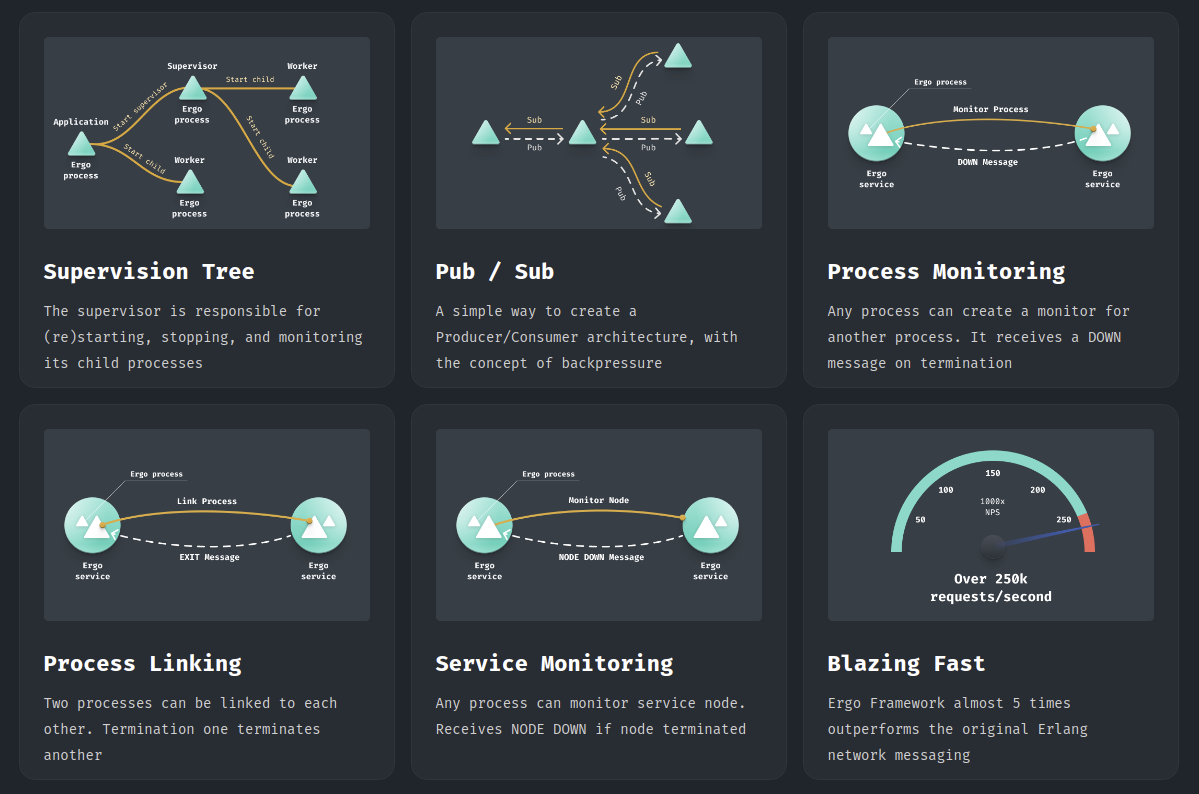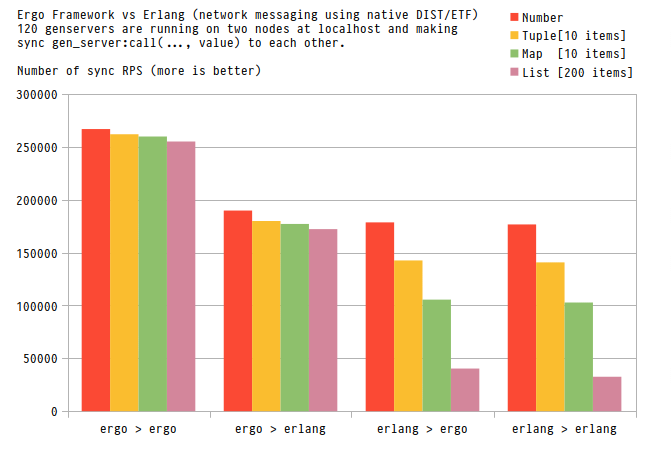Technologies and design patterns of Erlang/OTP have been proven over the years. Now in Golang. Up to x5 times faster than original Erlang/OTP in terms of network messaging. The easiest drop-in replacement for your hot Erlang-nodes in the cluster.
Purpose
The goal of this project is to leverage Erlang/OTP experience with Golang performance. Ergo Framework implements DIST protocol, ETF data format and OTP design patterns (GenServer/Supervisor/Application) which makes you able to create high performance and reliable application having native integration with Erlang infrastructure
Features
- Erlang node (run single/multinode)
- embedded EPMD (in order to get rid of erlang' dependencies)
- Spawn Erlang-like processes
- Register/unregister processes with simple atom
GenServerbehaviour support (with atomic state)Supervisorbehaviour support (with all known restart strategies support)Applicationbehaviour supportGenStagebehaviour support (originated from Elixir's GenStage)- Connect to (accept connection from) any Erlang node within a cluster (or clusters, if running as multinode)
- Making sync request
process.Call, async -process.Castorprocess.Sendin fashion ofgen_server:call,gen_server:cast,erlang:sendaccordingly - Monitor processes/nodes
- local -> local
- local -> remote
- remote -> local
- Link processes
- local <-> local
- local <-> remote
- remote <-> local
- RPC callbacks support
- Experimental observer support
- Unmarshalling terms into the struct using
etf.TermIntoStruct,etf.TermMapIntoStructoretf.TermProplistIntoStruct - Support Erlang 22. (including fragmentation feature)
- Encryption (TLS 1.3) support (including autogenerating self-signed certificates)
- Tested and confirmed support Windows, Darwin (MacOS), Linux
Requirements
- Go 1.15.x and above
Changelog
Here are the changes of latest release. For more details see the ChangeLog
1.2.0 - 2021-04-07
-
Added TLS support. Introduced new option
TLSmodeinergo.NodeOptionswith the following values:ergo.TLSmodeDisableddefault value. encryption is disabledergo.TLSmodeAutoenables encryption with autogenerated and self-signed certificateergo.TLSmodeStrictenables encryption with specified server/client certificates and keys
there is example of usage
examples/nodetls/tlsGenServer.go -
Introduced GenStage behaviour implementation (originated from Elixir world).
GenStageis an abstraction built on top ofGenServerto provide a simple way to create a distributed Producer/Consumer architecture, while automatically managing the concept of backpressure. This implementation is fully compatible with Elixir's GenStage. Example hereexamples/genstageor just run itgo run ./examples/genstageto see it in action -
Introduced new methods
AddStaticRoute/RemoveStaticRouteforNode. This feature allows you to keep EPMD service behind a firewall. -
Introduced
SetTrapExit/GetTrapExitmethods forProcessin order to control the trapping{'EXIT', from, reason}message -
Introduced
TermMapIntoStructandTermProplistIntoStructfunctions. It should be easy now to transformetf.Mapor[]eft.ProplistElementinto the given struct. See documentation for the details. -
Improved DIST implementation in order to support KeepAlive messages and get rid of platform-dependent
syscallusage -
Fixed
TermIntoStructfunction. There was a problem withTuplevalue transforming into the given struct -
Fixed incorrect decoding atoms
true,falseinto the booleans -
Fixed race condition and freeze of connection serving in corner case #21
-
Fixed problem with monitoring process by the registered name (local and remote)
-
Fixed issue with termination linked processes
-
Fixed platform-dependent issues. Now Ergo Framework has tested and confirmed support of Linux, MacOS, Windows.
Benchmarks
Here is simple EndToEnd test demonstrates performance of messaging subsystem
Hardware: laptop with Intel(R) Core(TM) i5-8265U (4 cores. 8 with HT)
Sequential GenServer.Call using two processes running on single and two nodes
❯❯❯❯ go test -bench=NodeSequential -run=XXX -benchtime=10s
goos: linux
goarch: amd64
pkg: github.com/halturin/ergo
BenchmarkNodeSequential/number-8 256108 48578 ns/op
BenchmarkNodeSequential/string-8 266906 51531 ns/op
BenchmarkNodeSequential/tuple_(PID)-8 233700 58192 ns/op
BenchmarkNodeSequential/binary_1MB-8 5617 2092495 ns/op
BenchmarkNodeSequentialSingleNode/number-8 2527580 4857 ns/op
BenchmarkNodeSequentialSingleNode/string-8 2519410 4760 ns/op
BenchmarkNodeSequentialSingleNode/tuple_(PID)-8 2524701 4757 ns/op
BenchmarkNodeSequentialSingleNode/binary_1MB-8 2521370 4758 ns/op
PASS
ok github.com/halturin/ergo 120.720s
it means Ergo Framework provides around 25.000 sync requests per second via localhost for simple data and around 4Gbit/sec for 1MB messages
Parallel GenServer.Call using 120 pairs of processes running on a single and two nodes
❯❯❯❯ go test -bench=NodeParallel -run=XXX -benchtime=10s
goos: linux
goarch: amd64
pkg: github.com/halturin/ergo
BenchmarkNodeParallel-8 2652494 5246 ns/op
BenchmarkNodeParallelSingleNode-8 6100352 2226 ns/op
PASS
ok github.com/halturin/ergo 34.145s
these numbers show around 260.000 sync requests per second via localhost using simple data for messaging
vs original Erlang/OTP
sources of these benchmarks are here
EPMD
Ergo Framework has embedded EPMD implementation in order to run your node without external epmd process needs. By default, it works as a client with erlang' epmd daemon or others ergo's nodes either.
The one thing that makes embedded EPMD different is the behaviour of handling connection hangs - if ergo' node is running as an EPMD client and lost connection, it tries either to run its own embedded EPMD service or to restore the lost connection.
As an extra option, we provide EPMD service as a standalone application. There is a simple drop-in replacement of the original Erlang' epmd daemon.
go get -u github.com/halturin/ergo/cmd/epmd
Multinode
This feature allows to create two or more nodes within a single running instance. The only need is to specify the different set of options for creating nodes (such as: node name, empd port number, secret cookie). You may also want to use this feature to create 'proxy'-node between some clusters. See Examples for more details
Observer
It allows you to see the most metrics/information using standard tool of Erlang distribution. The example below shows this feature in action using one of the examples:
Examples
Code below is a simple implementation of GenServer pattern examples/simple/GenServer.go
package main
import (
"fmt"
"time"
"github.com/halturin/ergo"
"github.com/halturin/ergo/etf"
)
type ExampleGenServer struct {
ergo.GenServer
process *ergo.Process
}
type State struct {
value int
}
func (egs *ExampleGenServer) Init(p *ergo.Process, args ...interface{}) (state interface{}) {
fmt.Printf("Init: args %v \n", args)
egs.process = p
InitialState := &State{
value: args[0].(int), // 100
}
return InitialState
}
func (egs *ExampleGenServer) HandleCast(message etf.Term, state interface{}) (string, interface{}) {
fmt.Printf("HandleCast: %#v (state value %d) \n", message, state.(*State).value)
time.Sleep(1 * time.Second)
state.(*State).value++
if state.(*State).value > 103 {
egs.process.Send(egs.process.Self(), "hello")
} else {
egs.process.Cast(egs.process.Self(), "hi")
}
return "noreply", state
}
func (egs *ExampleGenServer) HandleCall(from etf.Tuple, message etf.Term, state interface{}) (string, etf.Term, interface{}) {
fmt.Printf("HandleCall: %#v, From: %#v\n", message, from)
return "reply", message, state
}
func (egs *ExampleGenServer) HandleInfo(message etf.Term, state interface{}) (string, interface{}) {
fmt.Printf("HandleInfo: %#v (state value %d) \n", message, state.(*State).value)
time.Sleep(1 * time.Second)
state.(*State).value++
if state.(*State).value > 106 {
return "stop", "normal"
} else {
egs.process.Send(egs.process.Self(), "hello")
}
return "noreply", state
}
func (egs *ExampleGenServer) Terminate(reason string, state interface{}) {
fmt.Printf("Terminate: %#v \n", reason)
}
func main() {
node := ergo.CreateNode("node@localhost", "cookies", ergo.NodeOptions{})
gs1 := &ExampleGenServer{}
process, _ := node.Spawn("gs1", ergo.ProcessOptions{}, gs1, 100)
process.Cast(process.Self(), "hey")
process.Wait()
fmt.Println("exited")
}here is output of this code
$ go run ./examples/simple/GenServer.go
Init: args [100]
HandleCast: "hey" (state value 100)
HandleCast: "hi" (state value 101)
HandleCast: "hi" (state value 102)
HandleCast: "hi" (state value 103)
HandleInfo: "hello" (state value 104)
HandleInfo: "hello" (state value 105)
HandleInfo: "hello" (state value 106)
Terminate: "normal"
exitedSee examples/ for more details
Elixir Phoenix Users
Users of the Elixir Phoenix framework might encounter timeouts when trying to connect a Phoenix node to an ergo node. The reason is that, in addition to global_name_server and net_kernel, Phoenix attempts to broadcast messages to the pg2 PubSub handler
To work with Phoenix nodes, you must create and register a dedicated pg2 GenServer, and spawn it inside your node. Take inspiration from the global_name_server.go for the rest of the GenServer methods, but the Spawn must have "pg2" as a process name:
type Pg2GenServer struct {
ergo.GenServer
}
func main() {
// ...
pg2 := &Pg2GenServer{}
node1 := ergo.CreateNode("node1@localhost", "cookies", ergo.NodeOptions{})
process, _ := node1.Spawn("pg2", ergo.ProcessOptions{}, pg2, nil)
// ...
}Development and debugging
There is a couple of options are already defined that you might want to use
- -trace.node
- -trace.dist
To enable Golang profiler just add --tags debug in your go run or go build like this:
go run --tags debug ./examples/genserver/demoGenServer.go
Now golang' profiler is available at http://localhost:9009/debug/pprof
Companies are using Ergo Framework
is your company using Ergo? add your company logo/name here
Commercial support
please, visit https://ergo.services for more information








